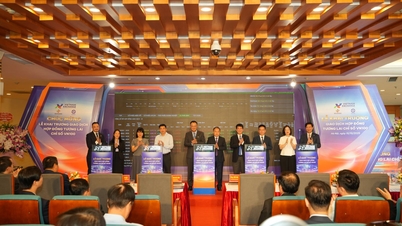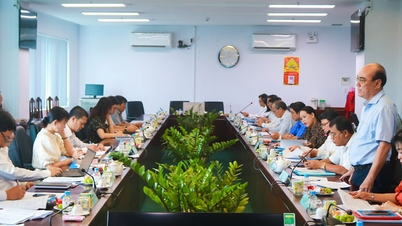Uneven digital transformation
In the past 5 years, many Vietnamese enterprises have initially applied digital technology in production and business activities. According to the analysis of the Department of Digital Economy and Society ( Ministry of Science and Technology ), Vietnamese enterprises have made significant changes in digital transformation, especially in the application of digital tools in management, marketing and customer care processes. However, the level of digital transformation still varies greatly between groups of enterprises, between urban and rural areas, between traditional and high-tech industries.

A recent nationwide survey conducted by the Vietnam Association of Small and Medium Enterprises in collaboration with the Ministry of Science and Technology showed that: 69% of businesses are at the basic application level such as email, accounting software; 16% have entered the system integration stage (ERP, CRM, IoT...); only 10% of businesses have fully digitized and integrated AI into operations; 5% of businesses have not yet started any digital transformation activities.
This reality reflects an uneven picture of the level of digital transformation in the business community, showing that many units have only stopped at the step of "digitalizing tools" without really changing their business model, operating processes or organizational culture towards digital.
In addition, businesses also face many difficulties such as: lack of financial resources, limited digital human resources, lack of specific orientation on digital transformation roadmap... This poses an urgent need for stronger support policies for businesses to move towards the stage of real digital transformation.
In order to solve the bottleneck, the Ministry of Science and Technology has issued a set of criteria to assess the level of digital transformation of enterprises, along with Decision No. 1567/QD-BKHCN dated June 30, 2025. This is the first time Vietnam has had an official set of tools for comprehensive, systematic assessment that can be widely applied in the business community.
The set of criteria is designed with many clear objectives such as: standardizing the approach, assessing the level of digital transformation in a quantitative manner, being able to compare between businesses and industries; classifying by business size, especially with separate criteria for small and medium enterprises (SMEs); supporting businesses to self-assess, detect strengths and weaknesses and build a suitable transformation roadmap. The set of criteria also serves as a basis for state management agencies to monitor progress and plan focused support policies.
Not only a simple technical tool, the set of criteria also plays an important role in creating a foundation for a professional consulting, evaluation and support ecosystem for digital transformation of enterprises. This is also a necessary step to form a national database on the level of digital transformation in enterprises, serving research, forecasting and medium and long-term policy management.
Along with the issuance of the criteria, the Ministry of Science and Technology is developing the Project "Digital transformation of enterprises, cooperatives and business households in the period 2026 - 2030". The project sets the target for small and medium enterprises as follows: bringing at least 650,000 enterprises to the "Starting" level; 250,000 enterprises to the "Acceleration" level; 80,000 enterprises to the "Optimal" level and 20,000 enterprises to the "Elite" level.
Along with that, support 100% of cooperatives and eligible business households to apply effective digital transformation solutions to improve labor productivity; support 50,000 enterprises to innovate in production and business activities; have digital transformation solutions to help increase labor productivity by at least 15% in the converted process, applying technology.
In particular, the Project also provides a mechanism for implementing support based on the principle of reciprocity: the State supports up to 50% within 1 year; small and medium enterprises, cooperatives, and business households pay the rest. The support is appropriate to the level of readiness for digital transformation of each subject according to 25 industries and occupations, ensuring the provision of the right and sufficient tools and necessary solutions.
Implement into life
Mr. Le Anh Tuan, Deputy Director of the National Digital Transformation Agency, said: To concretize the Party's guidelines in implementing digital transformation from 2020 to present, the Government and the Prime Minister have issued programs and strategies on a national scale such as: Decision No. 749/QD-TTg (2020) approving the National Digital Transformation Program to 2025, with a vision to 2030, identifying three main pillars: Digital Government, digital economy , digital society; Decision No. 942/QD-TTg (2021) approving the Strategy for developing e-Government towards digital Government for the 2021-2025 period, with a vision to 2030; Decision No. 411/QD-TTg (2022) approving the National Strategy for developing digital economy and digital society to 2025, with a vision to 2030.

Resolution No. 57-NQ/TW affirms the role of science, technology, innovation and national digital transformation as the main pillars and decisive factors to develop the country in the digital age, demonstrating the strategic vision and political determination of the Party. To implement this Resolution, the Government issued Resolution No. 03/NQ-CP dated January 9, 2025 and Resolution No. 71/NQ-CP dated April 1, 2025 on the Action Program to implement Resolution 57-NQ/TW.
"It can be said that the work of directing, operating and organizing the implementation of national digital transformation tasks has been carried out with high political determination, great efforts and drastic actions," said Mr. Le Anh Tuan.
Regarding the implementation of Resolution No. 71/NQ-CP and Plan No. 02-KH/BCĐTW, as of the end of September 2025, the total number of assigned tasks was 679, of which 277 tasks were completed (186 completed on time, 91 completed overdue); 24 overdue tasks were not completed; 378 tasks are being implemented.
Ministries, branches and localities have made efforts to deploy and complete 186 tasks for 2025, showing a strong change in promoting science, technology, innovation and digital transformation in Vietnam.
However, in addition to achievements, the process of implementing national digital transformation still faces a number of systemic difficulties and problems: institutions and legal policies have not kept up with reality; infrastructure and data are not synchronized; connection and interconnection are still limited; information technology human resources at the grassroots level are still lacking and weak...
Based on this reality, the Ministry of Science and Technology has drafted the Law on Digital Transformation to address difficulties in costs and technology. Regarding finance, the draft Law identifies digital infrastructure, digital public infrastructure, and digital technology industry infrastructure as national strategic infrastructure. The State prioritizes investment and mobilization of social resources to build and modernize digital infrastructure, ensuring synchronization, safety, sustainability, and greenness.
Regarding technology, the draft Law encourages research, development, and mastery of digital technology for digital transformation; prioritizes the use of "Make in Vietnam" digital technology products and services in investment projects using the state budget.
Regarding cybersecurity and safety, the draft Law stipulates the obligation to comply with the law and the responsibilities of platform businesses in handling harmful content, protecting data and digital sovereignty.
Regarding the protection of personal rights, the draft Law has a chapter on digital society, with the principle of “people-centeredness”; protecting the rights and legitimate interests of citizens; universalizing basic digital services; prioritizing children, people with disabilities, ethnic minorities and vulnerable groups; and building a culture of civilized behavior in the digital environment.
"These regulations are expected to build "digital trust" so that people and businesses can confidently participate, ensuring citizens' rights, and at the same time, everyone can enjoy the results of digital transformation in a fair and safe manner," said Mr. Le Anh Tuan.
Source: https://baotintuc.vn/xa-hoi/hoan-thien-the-che-cho-chuyen-doi-so-20251008235047528.htm





![[Photo] Standing member of the Secretariat Tran Cam Tu works with the Standing Committee of the Party Committee of the Ministry of Health](https://vphoto.vietnam.vn/thumb/1200x675/vietnam/resource/IMAGE/2025/10/10/1760079818773_image-4-6972-jpg.webp)
![[Photo] "Exposing letters" in the flood center of Lang Son](https://vphoto.vietnam.vn/thumb/1200x675/vietnam/resource/IMAGE/2025/10/10/1760080117518_ndo_br_z7101324112737-07cd4d1c01801a8ccf4ae0cbaf31c4a3-507-jpg.webp)
![[Photo] Unique Phu Gia horse hat weaving craft](https://vphoto.vietnam.vn/thumb/1200x675/vietnam/resource/IMAGE/2025/10/10/1760084018320_ndo_br_01-jpg.webp)

























































![[Photo] President Luong Cuong presents decisions on conferring titles and appointing Vietnamese Ambassadors](https://vphoto.vietnam.vn/thumb/402x226/vietnam/resource/IMAGE/2025/10/10/1760082105623_image-1.jpeg)


































Comment (0)